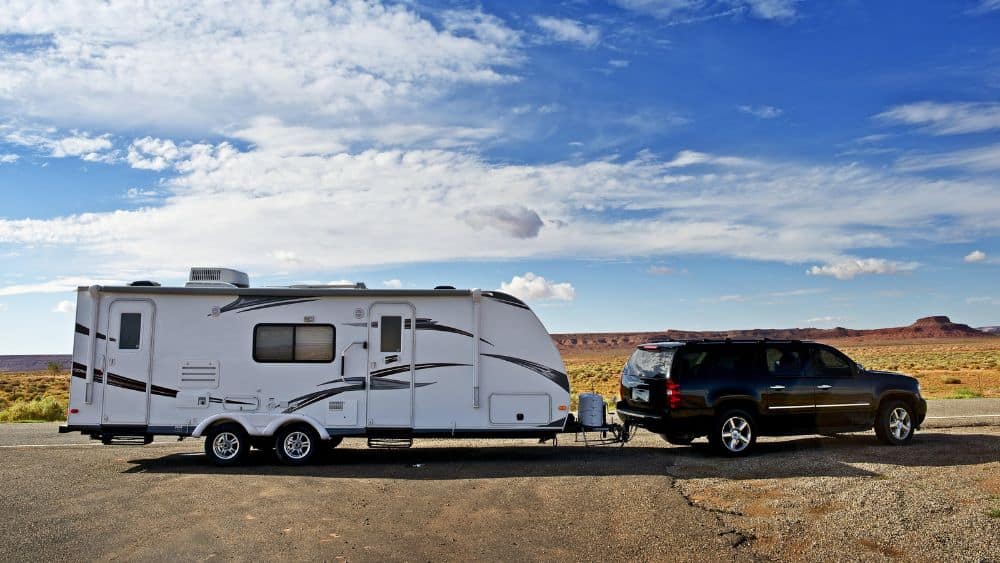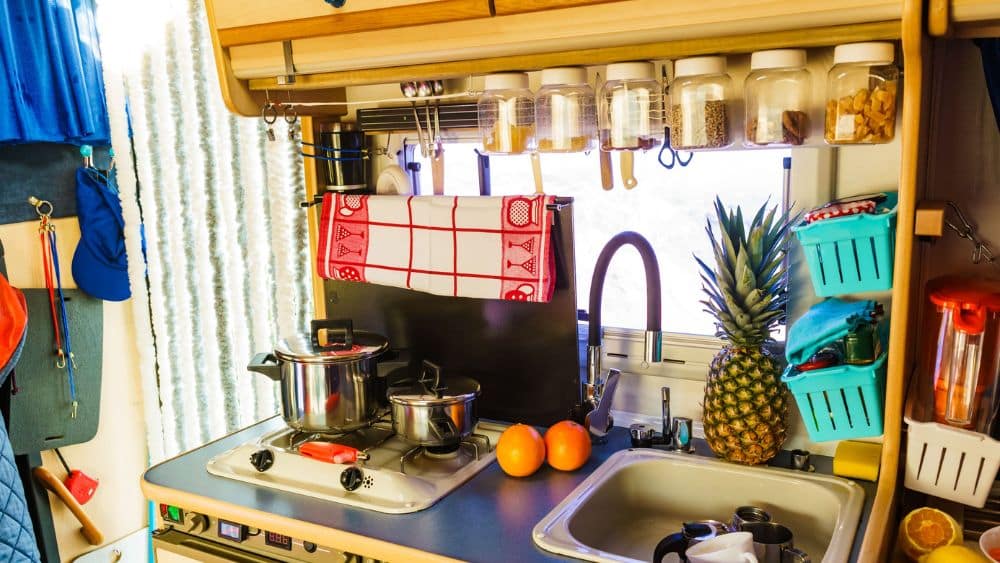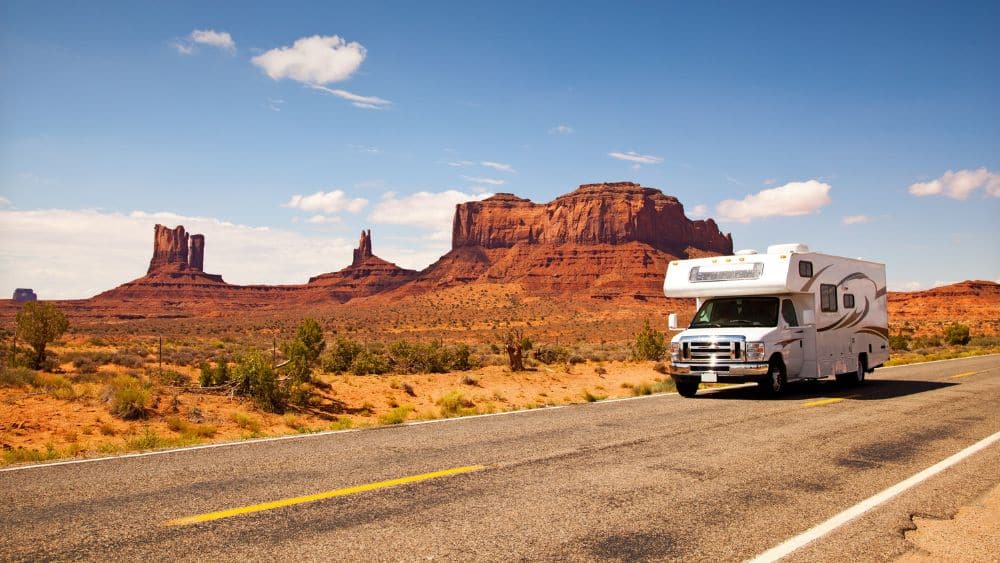Outdoor enthusiasts, cross-country travelers, and crafty minimalists constantly seek out adventure on the open road. If you’re always planning your next journey, you might consider a tiny home option that will allow you to take all your belongings with you on your travels. Consider an RV tiny home, which would allow you to test out life on the road for a few weeks before ultimately making the full switch.
While living in an RV may seem very minimalist and cost-saving at first, there are some hidden expenses that you should know before you purchase. Take some time to familiarize yourself with the anticipated budget and plan accordingly so you’re not caught by surprise when you run out of money.
To live in an RV full time, homeowners should plan for a range between $1,000 and $5,000 per month in expenses aside from the actual costs of the motorhome and towing vehicle. Monthly expenses depend on personal lifestyle preferences and proximity to overnight parking and amenities. Here’s a breakdown of the individual costs to help you plan your next move.
RV and Standard Vehicle (up to $350,000)

The cost of an RV can vary widely from $10,000 to purchase a preowned, bare-bones model to $300,000 for a top-tier luxury brand with all the bells and whistles. Because it is critical to factor your loan repayment into your budget, know how much you are willing to spend each month before you begin shopping. Keep in mind that interest rates tend to be higher for recreational motorhomes than for standard commercial vehicles.
In addition, if you plan to take your RV anywhere rather than plant it in one spot, you will need a standard vehicle to either tow the RV or tow the car behind it. Towing vehicles require a bit more horsepower to get the motorhome up and moving. These can cost between $40,000 and $50,000 or more. If you plan to drive the RV and tow a smaller vehicle for outings to the grocery store or errands while your RV is parked, then the cost may be up to $20,000.
Towing System ($1,000)
Some RVs come with a factory-installed hitch, but others will require owners to purchase a hitch unless they choose to upgrade for reliability and ride experience. Fifth-wheel hitches typically cost more than a traditional travel trailer hitch, but a towing and braking system is in the ballpark of $300-$1,000. A larger size and higher towing capacity will cost more.
Parking and Campsite Fees (Varies)
A not insignificant portion of monthly RV expenses goes to overnight parking. RV owners usually pay to park at RV resorts and campgrounds, which gives them access to facilities such as laundry, bathrooms, showers, and services like water, electricity, sewage, and Wi-Fi. These typically cost between $50 and $100 per night but can vary by location, season, and length of stay. Some sites will offer a cost break for weekly or monthly rates.
Some RV campers have managed to lower their monthly costs by staying at free campsites. This requires a lot of pre-planning and RV owners should be aware that free lots typically will not come with any amenities or services that paid campsites usually offer. Most free campgrounds are on public lands stewarded by the Forest Service Land, Bureau of Land Management, or Wildlife Management Areas. In some states, certain retailers of camping and recreational goods will allow motorhomes to park overnight in their lots at no cost, but RV travelers will have no access to amenities.
Gas and Propane (Varies)

Fuel is easily the largest portion of an RV’s monthly budget. The average cost per month depends on the size and weight of the vehicle, the amount you drive, the season of the year, and the current state of gas prices due to economic fluctuations. For standard RVs, 5 to 10 miles per gallon is average. Some converted vans can reach 20-25 miles per gallon if they are on the smaller and lighter side. Trucks hauling a travel trailer or mid-size RV usually get between 7 and 18 miles per gallon. To save a few cents on gas, RV owners can look for shopper rewards programs and apps to help them locate the cheapest fuel in the area. A few cents per gallon adds up over time!
RV owners will also need propane to cook meals. This will likely be used more frequently in the cooler months, so the expense can vary throughout the year. Propane is usually around $20 per tank and can be refilled at most campgrounds.
Repairs and Maintenance ($1,500 annually)
Think of this category as your regular upkeep budget. Your RV is your home and as such requires regular cleaning, tune-ups, maintenance, and the occasional repair. If you keep your systems running smoothly, you can save quite a bit in the long run on more expensive repairs down the road. Depending on the size and type of RV, distance driven, and local road and weather conditions, RV owners can expect an average expense of $1,200 to $1,500 annually for repairs and maintenance.
Food (Varies)

When you are living on the road, careful planning must go into your food budget. Buying in bulk is not a viable option and fresh foods spoil quickly; the issue of limited storage for food also leaves few options. Depending on the number of people living in the RV, time spent on the road, and dietary restrictions, this line item will vary for individual RV owners. Be sure to take some time to plan out your meal options and cost estimates before traveling in your RV.
Insurance ($3,000 annually)
RV owners must carry RV insurance to be compliant with the law. RV insurance for a full-time RV lifestyle is more expensive than a recreational use RV because it dually serves as a homeowner’s insurance policy. It usually includes coverage for personal property and emergency expenses in case your RV becomes uninhabitable. A comprehensive policy is recommended to protect your safety and your investment. Costs will vary by make, model, and state of registration, but are usually between $1,000 and $3,000 per year for full-time RV use. RV owners may be able to lock in a favorable discounted rate if they choose to bundle their RV and auto insurance with the same company.
Technology ($100-$200 monthly)

Disconnection from technology while on the road certainly has its perks, but not when you depend on reliable and secure Wi-Fi for work and communication with family or friends. RV owners should factor in cell phone expenses, if for nothing else than to serve as a lifeline in case of an emergency or engine breakdown.
Additionally, many RV owners purchase mobile hotspots, occasionally from multiple companies at a time to avoid spotty coverage, to be able to perform basic job tasks online. Some campsites offer Wi-Fi but it may be unsecured or have a poor signal, which could put you at risk for data hackers.
Registration and Taxes (Varies by state)
No matter where you live, you will be required to purchase annual licensing and registration, and usually will be expected to pay taxes on the vehicle. However, this will vary by state and local authorities. Check with your Department of Motor Vehicles to learn more about the fee schedule and requirements.
Miscellaneous Expenses

Other miscellaneous items will naturally come up to affect your budget while on the road. It’s best to give yourself some cushion to account for needs that arise, such as laundry, mail forwarding, and any equipment to make life on the road smoother such as an electric generator or composting toilet.
If you live on the road but use a specific address as your home state or “domicile” address for your taxes and registration, you might later decide to sell your home and establish a new domicile address. If this is the case, be aware that it may be wise to hire an attorney to aid the process. Laws around domiciling are complicated and registering your RV incorrectly may result in legal consequences.
Finally, don’t forget to create a “Fun Budget,” for all the sightseeing, guided tours, amusement parks, museums, and unique restaurants that you will encounter on your travels. This could very well be the most important part of the overall budget, since it’s likely the reason for buying the RV in the first place.
Life On the Open Road
Living in an RV has unique benefits and drawbacks. The overall cost will vary widely by your lifestyle, interests, and location. Use this guide as a baseline to determine what you can and cannot live without. Keep a log of your finances spent over the first few months to get an idea of where your money is going and make adjustments as needed. Before you know it, you’ll be traveling to different places to view the colorful sunrise every morning from your very own home!
